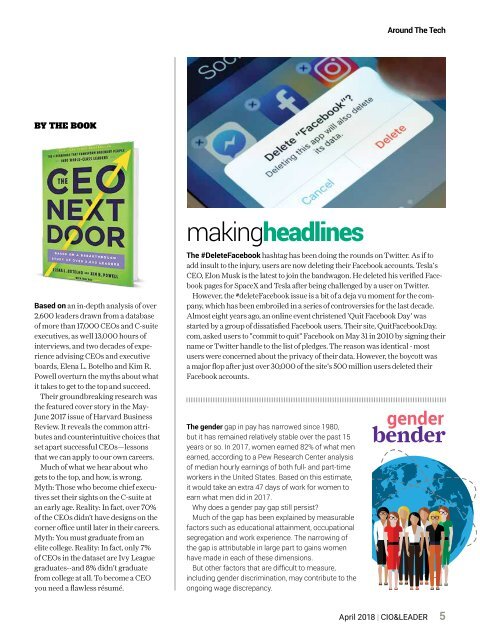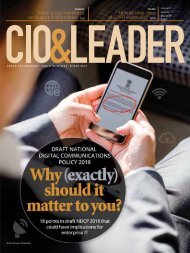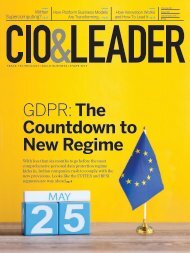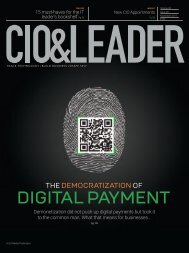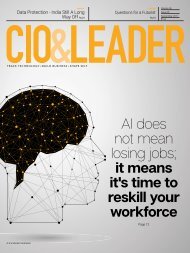CIO & LEADER-Issue-01-April 2018 (1)
Create successful ePaper yourself
Turn your PDF publications into a flip-book with our unique Google optimized e-Paper software.
Around The Tech<br />
By the Book<br />
Based on an in-depth analysis of over<br />
2,600 leaders drawn from a database<br />
of more than 17,000 CEOs and C-suite<br />
executives, as well 13,000 hours of<br />
interviews, and two decades of experience<br />
advising CEOs and executive<br />
boards, Elena L. Botelho and Kim R.<br />
Powell overturn the myths about what<br />
it takes to get to the top and succeed.<br />
Their groundbreaking research was<br />
the featured cover story in the May-<br />
June 2<strong>01</strong>7 issue of Harvard Business<br />
Review. It reveals the common attributes<br />
and counterintuitive choices that<br />
set apart successful CEOs—lessons<br />
that we can apply to our own careers.<br />
Much of what we hear about who<br />
gets to the top, and how, is wrong.<br />
Myth: Those who become chief executives<br />
set their sights on the C-suite at<br />
an early age. Reality: In fact, over 70%<br />
of the CEOs didn’t have designs on the<br />
corner office until later in their careers.<br />
Myth: You must graduate from an<br />
elite college. Reality: In fact, only 7%<br />
of CEOs in the dataset are Ivy League<br />
graduates--and 8% didn't graduate<br />
from college at all. To become a CEO<br />
you need a flawless résumé.<br />
makingheadlines<br />
The #DeleteFacebook hashtag has been doing the rounds on Twitter. As if to<br />
add insult to the injury, users are now deleting their Facebook accounts. Tesla's<br />
CEO, Elon Musk is the latest to join the bandwagon. He deleted his verified Facebook<br />
pages for SpaceX and Tesla after being challenged by a user on Twitter.<br />
However, the #deleteFacebook issue is a bit of a deja vu moment for the company,<br />
which has been embroiled in a series of controversies for the last decade.<br />
Almost eight years ago, an online event christened 'Quit Facebook Day' was<br />
started by a group of dissatisfied Facebook users. Their site, QuitFacebookDay.<br />
com, asked users to "commit to quit" Facebook on May 31 in 2<strong>01</strong>0 by signing their<br />
name or Twitter handle to the list of pledges. The reason was identical - most<br />
users were concerned about the privacy of their data. However, the boycott was<br />
a major flop after just over 30,000 of the site's 500 million users deleted their<br />
Facebook accounts.<br />
The gender gap in pay has narrowed since 1980,<br />
but it has remained relatively stable over the past 15<br />
years or so. In 2<strong>01</strong>7, women earned 82% of what men<br />
earned, according to a Pew Research Center analysis<br />
of median hourly earnings of both full- and part-time<br />
workers in the United States. Based on this estimate,<br />
it would take an extra 47 days of work for women to<br />
earn what men did in 2<strong>01</strong>7.<br />
Why does a gender pay gap still persist?<br />
Much of the gap has been explained by measurable<br />
factors such as educational attainment, occupational<br />
segregation and work experience. The narrowing of<br />
the gap is attributable in large part to gains women<br />
have made in each of these dimensions.<br />
But other factors that are difficult to measure,<br />
including gender discrimination, may contribute to the<br />
ongoing wage discrepancy.<br />
gender<br />
bender<br />
<strong>April</strong> 2<strong>01</strong>8 | <strong>CIO</strong>&<strong>LEADER</strong><br />
5


